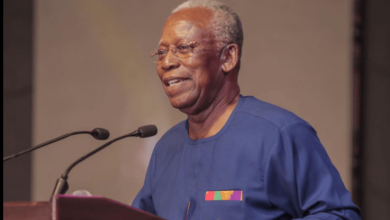Cedi depreciation: Gov’t is working to resolve the problem – Palgrave

Palgrave Boakye-Danquah, the government’s spokesperson on security and governance, has said the Akufo-Addo-led NPP government is working tirelessly to resolve the economic challenges, especially the depreciation of the Cedi.
He urged Ghanaians to be patient with the government, emphasising that it is early days yet for the Cedi to stabilise despite the US$1.2 billion received from the International Monetary Fund (IMF) under the ongoing extended credit facility programme.
“I would state that it is early days yet we would need to allow some time more to be able to see the impact of these monies that we have received…maybe before the mid-year review.
“A bit more time before the mid-year [budget] review we should be able to see that the Finance Ministry would bring some stability,” he said on TV3 New Day on Wednesday, May 15.
Responding to whether the cedi would keep depreciating until the mid-year budget review, Mr. Aboagye-Danquah said, “I’m not too sure if the cedi would keep depreciating but…if people have Forex that they are keeping, they should release those Forex.”
Read also: The rate of Cedi depreciation this year is lower than last year – Finance Minister
He, however, cited the fact that people keep foreign currencies outside the banks as likely to result in the cedi’s continued depreciation.
GUTA decries high exchange rate
The fall of the cedi against the major trading currencies, especially the dollar, has resulted in increasing costs of doing business in Ghana, according to the President of the Ghana Union of Traders Association (GUTA), Dr Joseph Obeng.
Dr Obeng said that businesses are unable to service their debts with the banks because of the exchange rate issues.
“We’re unable to service debt at banks, the cost of doing business has gone up,” he told Alfred Ocansey on Ghana Tonight on Monday.
Cedi will take a rest and continue the fall – Prof. Bokpin on Cedi depreciation
GUTA, in a statement on May 14, expressed “deep frustration over the current depreciation of the cedi, which is creating a big mess for the business community, especially, the trading sector. This seeming crisis coupled with the ever-rising freight charges from Asia are rendering the cost of doing business unbearable.”
Cedi depreciation due to weak fundamentals?
Meanwhile, a lecturer at the Department of Finance at the University of Ghana Business School (UGBS) has attributed the depreciation of the cedi to “weak fundamentals.”
Dr. Benjamin Amoah said, “The fundamentals are definitely weak. We should not play jokes about it. The truth is that the fundamentals are very weak. What is the fundamental here? What is the inflation rate as we speak now and what is has been the inflation rate over time, very high. What is interest rate, that is the fundamental factor, it is very high.”
“What is unemployment rate now? Unemployment rate is very high. What is our balance of payment position, it is very high and these are the very fundamentals that is used in accessing the exchange rate.”
According to him, the government addressing just one of the indicators does not resolve the depreciation of the cedi, stating that “it requires effective management of each of these factors.”
The cedi was trading against the dollar at GH₵ 11.98 but now hovering around GH₵ 14.80 at the forex bureaus, resulting in a depreciation rate of close to 20% since the beginning of the year.







